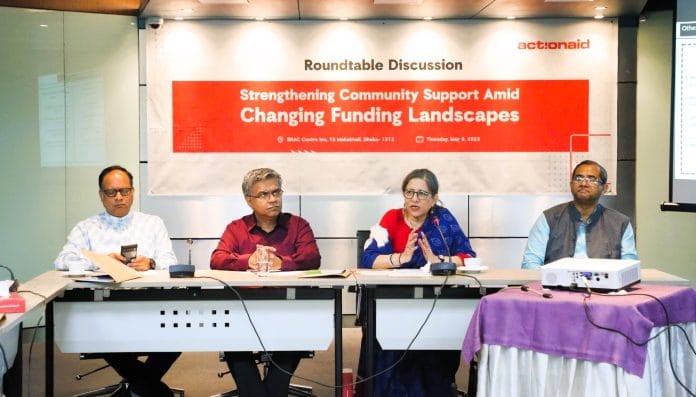A sharp drop in foreign aid to Bangladesh’s development sector, particularly the initiatives supporting marginalised communities, has been a serious concern, experts warned at a roundtable in Dhaka on Thursday.
Held at the BRAC Centre Inn and organised by ActionAid Bangladesh, the event brought together civil society representatives, academics, development professionals, and journalists to address the growing funding crisis.
Speakers noted that foreign assistance to NGOs fell by over 11% last year, with aid totaling USD 655 million, down from one billion US dollar in 2020.
The decline is attributed to global donor fatigue, Bangladesh’s new status as a middle-income country, shifting global priorities, and changes in international aid policies. Sudden funding cuts from major donors, including the United States, have already forced some key projects to shut down.
Experts stressed the need for alternative financing models such as corporate social responsibility (CSR), microfinance, and social enterprises.
Experts emphasised that to sustain ongoing development efforts, greater focus is needed on resilient and sustainable funding models—such as microfinance, social enterprises, and corporate social responsibility (CSR) contributions from the private sector.
Dr Khondaker Golam Moazzem of the Centre for Policy Dialogue urged policymakers to create a national CSR framework and support new funding avenues, including south-south cooperation.
“As LDC graduation is set to significantly impact CSOs, we must explore south-south funding, adopt a CSR policy, that could be led by the Finance Ministry, to channel private sector support, promote digital and structural reforms in both government and CSOs, ensure democratic leadership transitions, and advocate for a dedicated Tk 1,000 crore budget to sustain rights-based social development amid shifting political mindsets,” he said.
ActionAid Bangladesh’s Country Director, Farah Kabir, called for collective action and innovative solutions to overcome the ongoing crisis.
“The current funding shortage is disrupting access to essential primary healthcare and social protection services in underserved urban and rural areas. Women, children, and marginalised populations are particularly at risk,” she said.
“If left unaddressed, this situation could lead to deepening inequality, rising poverty, and diminished public trust in development initiatives. Active and collaborative steps are urgently needed to ensure the sustainability of community development efforts,” she warned.
With Bangladesh set to graduate from Least Developed Country (LDC) status, speakers called for strategic reforms and better use of local resources to ensure long-term sustainability in development efforts.
M Zakir Hossain Khan,chief executive of Change Initiative, Prof Dr Sharmin Nilormi of Jahangirnagar University’s Department of Economics, among others, also spoke at the event.
The roundtable discussion concluded with a closing speech by AAIBS Board Chairperson Ibrahim Khalil Al-Zayad.

